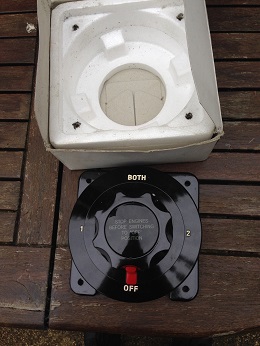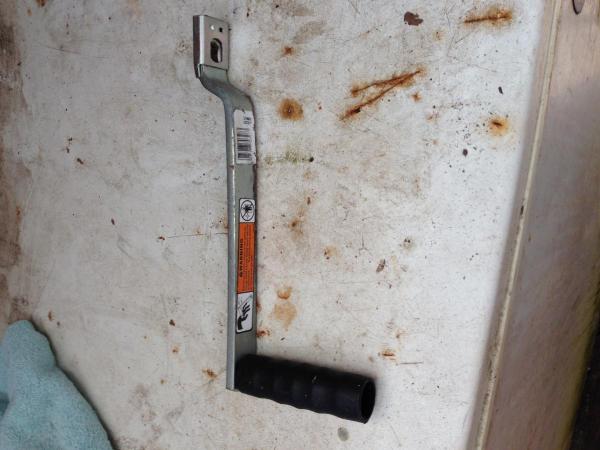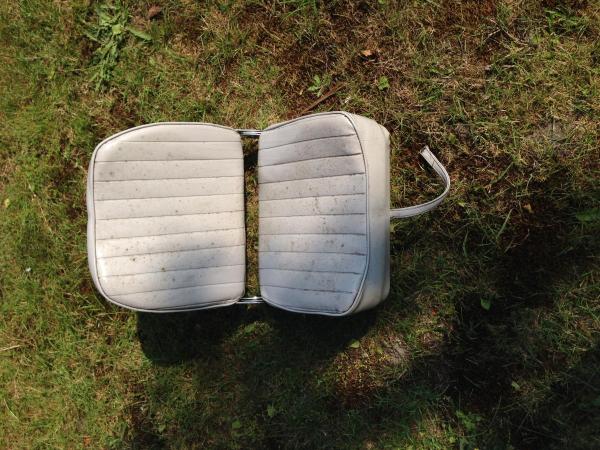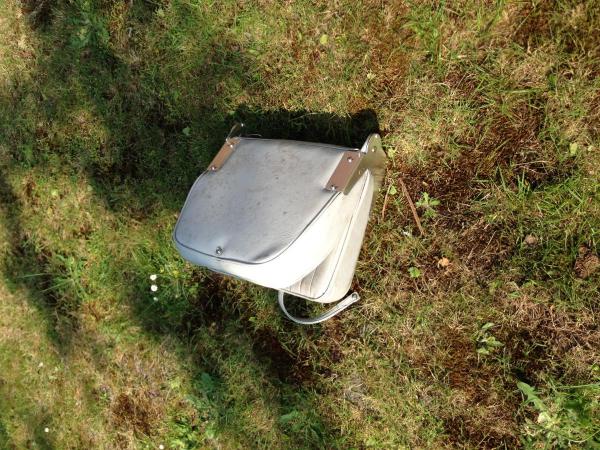-
Posts
5,200 -
Joined
-
Last visited
-
Days Won
40
Content Type
Profiles
Forums
Blogs
Events
Gallery
Everything posted by Coddy
-
Belated Birthday greetings Allan Dave
-
Welcome Tony Jump right in and ask as many questions as you like as there is a wealth of knowledge within the club. We all started boat owning with whatever knowledge we had, by attending training courses you will come not only proficient but safe as well which is the ethos of the club. We have a number of members who travel a distance to fish and some, like your proposing, keep their boats down in the Poole area. We have monthly meetings on the first Thursday in the month, these tend to be a friendly chat and demos or talks by interesting people or groups. As Adam suggests join the club as there are many benefits in being a member and you get to see far more of the club's forum. Dave
-
Boat Sold and gone Time for a man shed
-
I think many people are missing the point of the list. I see so many people asking "how many amps does this or that draw?" "How long can I run xxx without draining the battery?" Don't forget that the list was NOT made up by me but from one of my battery suppliers. I think it also applied to motorhomes which is where some of the heavy drain could occur. I just thought it might help those who are not so "electrically savvy" as others. It also goes to show that using a "Leisure" battery as a starting battery is not a good idea for long liveability
-
Came across this and I thought it might help those who are considering buying a new battery for the boat. Anatomy of a Typical Battery In recent times there have been advances in battery technology and VRLA batteries have become very popular. VRLA stands for valve regulated lead-acid and is the designation for low maintenance lead acid batteries, also called recombinant batteries. VRLA batteries are commonly further classified as: Absorbent glass mat battery (AGM) Gel battery These batteries are often called sealed lead-acid batteries, but this term is misleading. A sealed battery would be a safety hazard due to overpressure risks when overcharged and there is always a safety valve present, hence the name valve-regulated. Sealed is opposed to vented (also called flooded). Because VRLA batteries use much less electrolyte (battery acid) than traditional lead-acid batteries, they are also occasionally referred to as an “acid-starved” design. The name “valve regulated” does not wholly describe the technology; these are really “recombinant” batteries, which means that the oxygen evolved at the positive plates will largely recombine with the hydrogen ready to evolve on the negative plates, creating water–thus preventing water loss. The valve is strictly a safety feature in case the rate of hydrogen evolution becomes dangerously high. One result of this design is a much higher ratio of power to weight than large, flooded type battery systems; another is a high-rate power capacity, though of relatively short duration. As a result, VRLA batteries are frequently employed in UPS or other high-rate applications. Batteries can be subdivided further by application. They are many jobs batteries are asked to perform but the everyday jobs can be listed as follows: Engine Starting Lead acid batteries designed for starting engines are not designed for deep discharge. They have a large number of thin plates designed for maximum surface area, and therefore maximum current output, but which can easily be damaged by deep discharge. Repeated deep discharges will result in capacity loss and ultimately in premature failure, as the plates disintegrate due to mechanical stresses that arise from cycling. A common misconception is that starting batteries should always be kept on float charge. In reality, this practice will encourage corrosion in the electrodes and result in premature failure. Starting batteries should be kept open circuit but charged regularly to prevent sulfation. Deep Cycle Specially designed deep-cycle cells are much less susceptible to degradation due to cycling, and are required for applications where the batteries are regularly discharged, such as Photovoltaic systems, electric vehicles and UPS systems. These batteries have thicker plates that can deliver less peak current, but can withstand frequent discharging Marine/Motorhome batteries, sometimes called “leisure batteries”, are something of a compromise between the two, being able to be discharged to a greater degree than automotive batteries, but less so than deep cycle batteries. Sizing Your Deep Cycle Battery The chart below shows some typical examples of calculations necessary when trying to size your deep cycle batteries. Description Watt @12V Amps X hrs/day = Ah Autopilot 20 1.67 5.0 8.33 Echo Sounder 4 0.33 7.0 2.33 Instrument Lamp 10 0.83 5.0 4.17 Log 2 0.17 7.0 1.17 Nav. Lamps 80 6.67 6.0 40.00 VHF Transmission 50 4.17 0.2 0.83 VHF Reception 5 0.42 5.0 2.08 Fridge 55 4.58 8.0 36.67 Bilge Pump 50 4.17 0.1 0.42 Sink Pump 50 4.17 0.3 1.25 FM Radio 40 3.33 2.0 6.67 TV 40 3.33 2.0 6.67 Reading Lamp 15 1.25 3.0 3.75 Sundry 60 5.00 3.0 15.00 TOTAL 129.34 The total load in this scenario is 129.34Ah. Unfortunately you can not use a 130Ah battery as the battery will not be able to provide a useful voltage at 100% discharge. The recommended maximum depth of discharge for optimum battery performance and life is 50%. Therefore in this example you should have a minimum battery capacity of 260Ah. This can be made up using one very large 12V battery or multiple smaller batteries. It is important to remember most manufacturers recommend a maximum of three batteries in parallel. This is to avoid battery imbalance which can occur during normal cycling.
-
Thanks Allan Graham you have a PM. If anyone is interested Matts details are: ZRS Engineering www.zrs-engineering.com Email Matt@zrs-engineering.com Mobile 07814 148784 Dave (Matts Dad)
-
Check out my website for user reports on these boats Dave
-
Poole & District Sea Angling Association meeting at Broadstone Conservative Club at 8PM Everyone is welcome Dave
-
Jim The trick is to doo all those "little jobs" before you retire so you can take it easy when you do! At least that's what I have been told
-

Explorer Elite For Sale. FINAL REDUCTION £8750 ono
Coddy replied to 2006holmwood's topic in Swap and Shop
Good luck with the sale, I am sure it will go quickly for you. Watch out for scammers however! Dave -
It's only 50mls each way from Poole I know I go there enough times
-
It was a good start to the series
-
Happy Birthday Mick You never know you might catch something Sunday
-
Greg There is another picture of a Grey Gurnard in the Gallery under Fish ID's as well as a long of other species to help members Dave
-
Not sure everyone knows but Lowrance has come up with a fast GPS antenna called Point 1 The Point-1 easily connects to any HDS Gen2, HDS Gen2 Touch or Elite-7 display or any NMEA 2000® network. It is fully waterproof and can be pole or surface mounted on any boat. It is not cheap, about £190 but as it has a built in electronic compass which sends directions to your plotter a greater number of times than the older style. Some people have found they can hover precisely over the mark/wreck without having to anchor just need to juggle the throttle to keep on station. Thought some might be interested. For more info see here https://www.lowrance.com/Root/Lowrance-Documents/Point-1-FAQ-EN.pdf or just Google it. Dave
-
PBSBAC monthly meeting at Trades & Labour Club, Ashley Road, Poole 8pm start
-
Poole & District Sea Angling Association meeting at Southern IFCA's offices in Ashley Road, Poole 8pm Start all are welcome
-
Nice to see a good write up on the Barracuda comp and well done to those who got a mention in the report Sea Wolf Kellys' Hero Wishin'Too Dave
-
Yes still clearing out!!!!!!!!!!!! Found this 2-way rotary battery switch, brand new still in its box Required for ship's supply systems fed by two batteries. This robust ship's battery switch enables you to switch over from the first battery to the second or to operate or charge both batteries simultaneously. The switch is suitable for 6V, 12V and 24V ship's supply system. Spec: 6V: 300A (constant) / 350A (peaking briefly). 12V: 150A (constant) /175A (peaking briefly). 24V: 75A (constant) / 88A (peaking briefly Normally £40 sell for £20 PM me if you are interested. Dave
-
OK Paul no problem, shall I get it to Parkstone?
-
Found some more bits Fisherman,s Anchor & chain, a bit rusty but still goes together ok - £5 Trailer winch handle which clips onto the shaft - as new £5 - GONE Folding seat in good condition - £15 PM me if interested Dave
-
12ft of heavy mooring chain Free if collected - GONE 2 X large buckets with rope handles One has drain holes drilled in the base the other is watertight. Free if collected - GONE Large blue fender - Free if collected - GONE Quantity of BBQ charcoal, approx 1/2 bag - Free if collected Call or PM me Dave Sent from my iPhone using Tapatalk
-
`Happy Birthday Dave, going for 19 holes?
-
Getting ready for the PBSBAC & Dogfish Dave's open fishing comp. Going for the specimen comp I expect! Unless it is to stop speeding craft in the harbour ;)
-
Are they Lithium? I have a number of contacts in the battery industry and may be get some a bit cheaper for you. Let me know the specifications and I will see what I can do Dave







